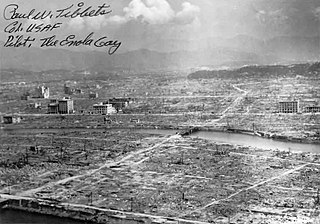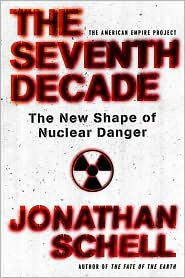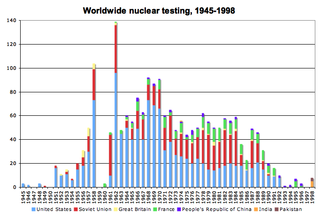
The Treaty on the Non-Proliferation of Nuclear Weapons, commonly known as the Non-Proliferation Treaty or NPT, is an international treaty whose objective is to prevent the spread of nuclear weapons and weapons technology, to promote cooperation in the peaceful uses of nuclear energy, and to further the goal of achieving nuclear disarmament and general and complete disarmament. Between 1965 and 1968, the treaty was negotiated by the Eighteen Nation Committee on Disarmament, a United Nations-sponsored organization based in Geneva, Switzerland.

Nuclear disarmament is the act of reducing or eliminating nuclear weapons. Its end state can also be a nuclear-weapons-free world, in which nuclear weapons are completely eliminated. The term denuclearization is also used to describe the process leading to complete nuclear disarmament.

A weapon of mass destruction (WMD) is a biological, chemical, radiological, nuclear, or any other weapon that can kill or significantly harm many people or cause great damage to artificial structures, natural structures, or the biosphere. The scope and usage of the term has evolved and been disputed, often signifying more politically than technically. Originally coined in reference to aerial bombing with chemical explosives during World War II, it has later come to refer to large-scale weaponry of warfare-related technologies, such as biological, chemical, radiological, or nuclear warfare.

Disarmament is the act of reducing, limiting, or abolishing weapons. Disarmament generally refers to a country's military or specific type of weaponry. Disarmament is often taken to mean total elimination of weapons of mass destruction, such as nuclear arms. General and Complete Disarmament was defined by the United Nations General Assembly as the elimination of all WMD, coupled with the “balanced reduction of armed forces and conventional armaments, based on the principle of undiminished security of the parties with a view to promoting or enhancing stability at a lower military level, taking into account the need of all States to protect their security.”

Jonathan Edward Schell was an American author and visiting fellow at Yale University, whose work primarily dealt with campaigning against nuclear weapons.

The nuclear weapons debate refers to the controversies surrounding the threat, use and stockpiling of nuclear weapons. Even before the first nuclear weapons had been developed, scientists involved with the Manhattan Project were divided over the use of the weapon. The only time nuclear weapons have been used in warfare was during the final stages of World War II when USAAF B-29 Superfortress bombers dropped atomic bombs on the Japanese cities of Hiroshima and Nagasaki in early August 1945. The role of the bombings in Japan's surrender and the U.S.'s ethical justification for them have been the subject of scholarly and popular debate for decades.
Dr. Randall Caroline Forsberg led a lifetime of research and advocacy on ways to reduce the risk of war, minimize the burden of military spending, and promote democratic institutions. Her career started at the Stockholm International Peace Research Institute in 1968. In 1974 she moved to Cambridge, Massachusetts to found the Institute for Defense and Disarmament Studies (IDDS) as well as to launch the national Nuclear Weapons Freeze Campaign. Randall Forsberg was accompanied by an important colleague by the name of Helen Caldicott while she was leading the Nuclear freeze movement in both Manhattan and Central Park. Both women were met with many challenges in their efforts to lead the Nuclear Freeze Movement. These challenges included gender discrimination and discreditation as influential leaders by the media. Forsberg's strong leadership in the nuclear freeze movement is thought to be very influential in the writing of foreign policy during the Reagan administration and is even credited with catalyzing the negotiation of the INF treaty between President Reagan and Mikhail Gorbachev.
Anti-nuclear organizations may oppose uranium mining, nuclear power, and/or nuclear weapons. Anti-nuclear groups have undertaken public protests and acts of civil disobedience which have included occupations of nuclear plant sites. Some of the most influential groups in the anti-nuclear movement have had members who were elite scientists, including several Nobel Laureates and many nuclear physicists.

The Seventh Decade: The New Shape of Nuclear Danger is a 2007 book by Jonathan Schell. It is described as a provocative book which explores the threat posed by some new nuclear policies of the United States.

In the 2001 book The Unfinished Twentieth Century, author Jonathan Schell suggests that an essential feature of the twentieth century was the development of humankind's capacity for self-destruction, with the rise in many forms of "policies of extermination". Schell goes on to suggest that the world now faces a clear choice between the abolition of all nuclear weapons, and full nuclearization, as the necessary technology and materials diffuse around the globe.
The Psychology of Nuclear Proliferation: Identity, Emotions, and Foreign Policy is a 2006 book by Jacques E. C. Hymans, published by Cambridge University Press. In the book, Hymans draws on the humanities and social sciences to build a model of decision-making that links identity to emotions and ultimately to nuclear energy policy choices.

Global Zero is an international non-partisan group of 300 world leaders dedicated to achieving the elimination of nuclear weapons. The initiative, launched in December 2008, promotes a phased withdrawal and verification for the destruction of all devices held by official and unofficial members of the nuclear club. The Global Zero campaign works toward building an international consensus and a sustained global movement of leaders and citizens for the elimination of nuclear weapons.
Since 1998 the Nuclear-Free Future Award (NFFA) is an award given to anti-nuclear activists, organizations and communities. The award is intended to promote opposition to uranium mining, nuclear weapons and nuclear power.

The Fate of the Earth is a 1982 book by Jonathan Schell. Its description of the consequences of nuclear war "forces even the most reluctant person to confront the unthinkable: the destruction of humanity and possibly most life on Earth". The work is regarded as a key document in the nuclear disarmament movement.

The application of nuclear technology, both as a source of energy and as an instrument of war, has been controversial.

Iran convened a conference titled "International Disarmament and Non-proliferation: World Security without Weapons of Mass Destruction" on 17 and 18 April 2010 in Tehran. The theme of the conference was Nuclear Energy for All, Nuclear Weapons for No One.
The William and Katherine Estes Award, previously known as the NAS Award for Behavioral Research Relevant to the Prevention of Nuclear War is awarded by the U.S. National Academy of Sciences "to recognize basic research in any field of cognitive or behavioral science that has employed rigorous formal or empirical methods, optimally a combination of these, to advance our understanding of problems or issues relating to the risk of nuclear war". It was first awarded in 1990.

The Campaign for Nuclear Disarmament (CND) is an organisation that advocates unilateral nuclear disarmament by the United Kingdom, international nuclear disarmament and tighter international arms regulation through agreements such as the Nuclear Non-Proliferation Treaty. It opposes military action that may result in the use of nuclear, chemical or biological weapons, and the building of nuclear power stations in the UK.
The Nuclear Freeze campaign was a mass movement in the United States during the 1980s to secure an agreement between the U.S. and Soviet governments to halt the testing, production, and deployment of nuclear weapons.











